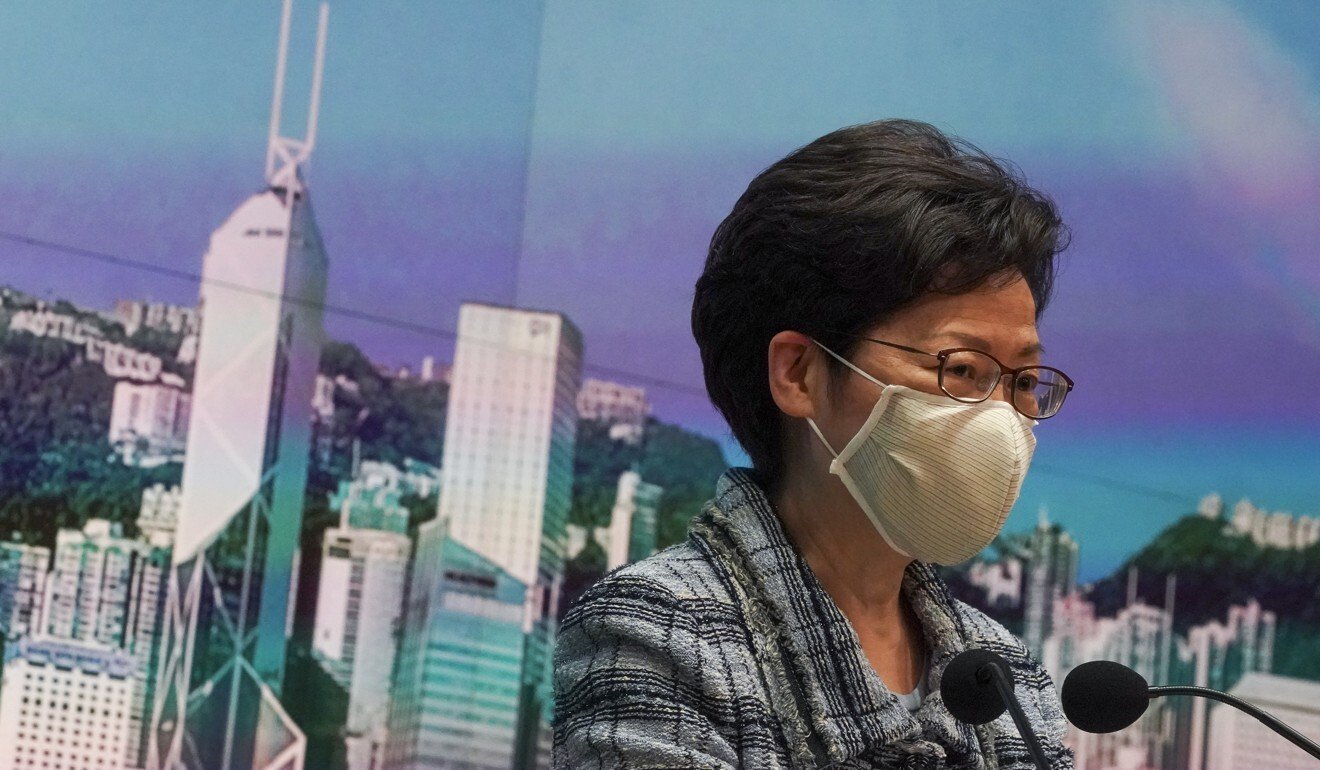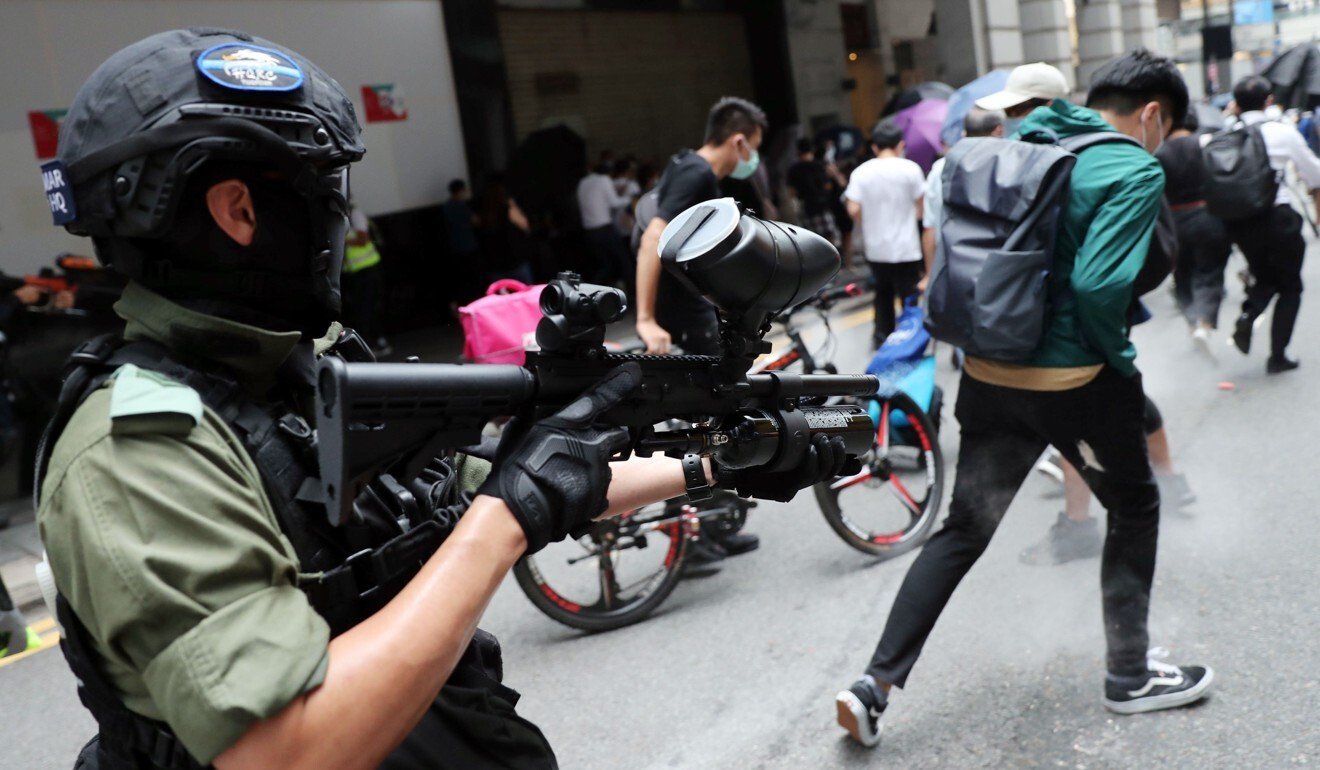
China’s foreign ministry vows countermeasures over Hong Kong sanctions
China’s foreign ministry vowed on Thursday to enact its own countermeasures in response to the United States accusing a group of Hong Kong and mainland officials of undermining the city’s autonomy with the adoption of a controversial national security law this summer.
The US State Department on Wednesday named 10 Hong Kong and mainland officials, including Chief Executive Carrie Lam Cheng Yuet-ngor, as “materially” contributing to the People’s Republic of China’s failure to meet its obligations under the Joint Declaration with the British government reached ahead of the city’s handover in 1997 and under the Basic Law, the city’s mini constitution.
“The Hong Kong issues are purely China’s internal affairs and no country has the right to make unwarranted remarks and interfere with the matter,” foreign ministry spokesman Zhao Lijian said during a press conference on Thursday, adding that China has lodged a formal protest with the US against the move.
“The US should correct its mistakes and stop interfering with Hong Kong affairs and China’s domestic politics. If the US insists on that, China will take resolute countermeasures to protect its sovereignty and national interest, and to safeguard the legal rights and interest of Chinese companies and related personnel.”
The Hong Kong government also voiced its opposition against the US move and urged the US to refrain from taking measures that might undermine the interests of the international financial system.
A government spokesman strongly reprimanded the American authorities for publishing a report that had “totally groundless and irresponsible accusations against the HKSAR”. He defended the introduction of the national security law and criticised the US’ threat to impose sanctions on financial institutions and government officials as another example of “US hegemony”.
“The US’ ‘sanctions’ will not create an obligation for financial institutions under Hong Kong law. Our financial institutions and our financial system as a whole are robust and resilient. They will continue to operate normally and smoothly despite any undue pressure from the US,” he said.
The comments from the Hong Kong and Chinese governments came as the city’s lenders, including the Hong Kong arms of China’s big state-owned banks, could soon find themselves in the firing line over the national security law.
Under the recently passed Hong Kong Autonomy Act, foreign financial institutions that engage in “significant” transactions with those individuals could face sanctions themselves, including being cut off from US dollar clearing activities. The Trump administration has 60 days to identify any banks which have done so and up to a year to enact any sanctions against those institutions.
Alfred He, an analyst at Jefferies, said the likelihood of the US sanctioning Chinese lenders is low. The exclusion of Stephen Lo Wai-chung, Hong Kong’s former police commissioner who was sanctioned in August alongside the 10 officials named on Wednesday, is an indication the US does not plan to escalate the situation further, he said.
“Instead of including more individuals on the list, they cut one,” He said. “We do not see the situation escalating at the moment.”
He cited US sanctions as a potential outlook risk in initiating coverage of several Hong Kong banks this week.
The threat of sanctions sent the shares of the city’s three currency-issuing lenders lower in trading in Hong Kong on Thursday.
HSBC, the biggest of the city’s lenders, fell 2 per cent to HK$29.90, while Standard Chartered declined 2.1 per cent to HK$35.65. Bank of China (Hong Kong) dropped 1.9 per cent to HK$21.15 and the H shares of its mainland parent fell 1.2 per cent to HK$2.48.
The imposition of sanctions has been used by the US as a way to exert maximum pressure on governments to dissuade them from engaging in nuclear proliferation or human rights violations, often by making everyday life difficult for political leaders and their families.
Because of the dominance of the US dollar as a trade currency, sanctioned individuals often face difficulty in engaging in transactions that come anywhere near the US financial system.
Banks and other businesses have paid tens of billions of dollars in fines in the past decade as the US more aggressively pursued institutions who facilitated transactions by blacklisted individuals and countries.

E-commerce retailer Amazon.com, for example, agreed to pay a US$134,000 penalty this July to settle a civil action by the Office of Foreign Assets Control, an arm of the US Treasury Department, over failures in its screening process that allowed sanctioned individuals in Crimea, Iran and Syria to engage in transactions on its website.
As a result, global banks – not just American lenders – are particularly cautious about maintaining accounts with so-called politically exposed persons and seek to close accounts or limit their interactions with those individuals at the first hint of potential sanctions.
As tensions rose between the world’s two biggest economies this year, global banks in the city began quietly reviewing their client lists
in anticipation of sanctions and other actions between Washington and Beijing.
Banks contacted for this story declined to comment or did not respond to requests for comment.
However, some lenders in Hong Kong have already severed ties with blacklisted city officials or strengthened their reviews of any transactions going forward with those individuals, according to people familiar with the matter.
Lam said she is having trouble using her credit cards since the sanctions were announced, which she has called a “meaningless” inconvenience.
Commissioner of Police Chris Tang Ping-keung transferred his mortgage from HSBC to Bank of China (Hong Kong) days ahead of the sanctions designation.
The challenge for lenders, such as HSBC and Standard Chartered, is particularly acute as their business revolves around the flow of trade between developed and emerging markets, with the US dollar serving as a key trade currency.
Under the Hong Kong Autonomy Act, lenders who engage in “significant” transactions with blacklisted officials can be cut off from serving as a so-called primary dealer in US Treasury bonds, engage in foreign exchange transactions involving the US dollar and not receive loans from American banks.
Their senior executives also face potential travel bans and sanctions themselves.
No Chinese lenders currently serve as primary dealers to the Federal Reserve Bank of New York, but HSBC’s US arm does.
Global banks in the city also have to worry about running afoul of the national security law itself, which bars sanctions against the city or mainland China, and an “unreliable entities” list being drafted by Beijing.
Nationalistic tabloid Global Times has said HSBC could potentially be added to the “unreliable entities” list for its prior help in a US investigation into Chinese telecommunications giant Huawei Technologies.

“HSBC is caught in the crossfire of potential sanctions by the US under the HK Autonomy Act and risk of being named ‘unreliable’ by China,” Citigroup analyst Yafei Tian said in a September 22 research note. “Should it be on the list, even without tough measures taken, its mainland China business would likely be adversely impacted as its clients reduce transactions. Mainland China clients in [Hong Kong] might also avoid unnecessary transactions with HSBC HK. In a worst-case scenario, HSBC might be forced to divest its investments in mainland China.”
Standard Chartered has a similar exposure to the mainland, but it could face “less political risk” because of its involvement in the country’s Belt and Road Initiative, Tian said.
The US State Department must designate any financial institutions who engaged in those transactions within the next 30 to 60 days and the US President must enact at least five types of sanctions against those institutions within a year’s time.
However, enacting sanctions could fall to the successor to US President Donald Trump, who is trailing former vice-president Joe Biden in several national polls.
And, the sitting President has the ability to remove foreign financial institutions from sanctions if the transactions are “not likely to be repeated in the future” or have been reversed or mitigated through “positive countermeasures”.










